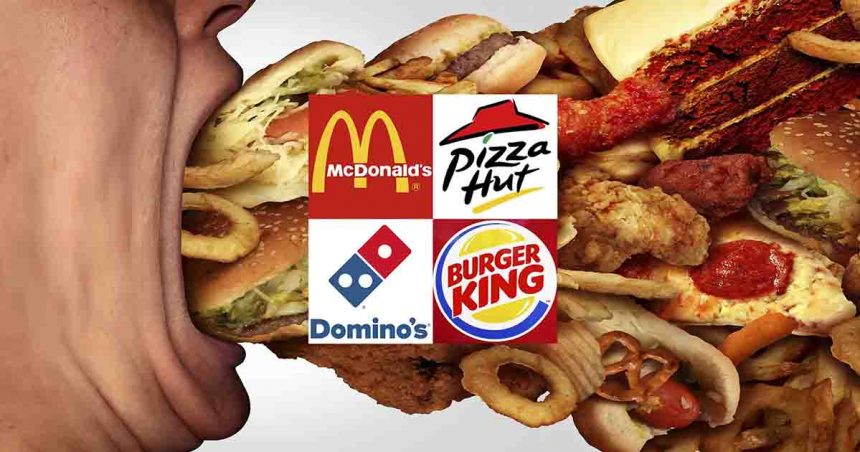Fast food has long been associated with health concerns due to its high calorie, fat, and sodium content. However, a recent report has shed light on another issue related to popular fast-food chains like McDonald’s, Burger King, Pizza Hut, and Domino’s.1 Researchers from George Washington University conducted a study and found that these fast-food items contain toxic chemicals known as phthalates, which have been linked to infertility and other health problems. This article will delve into the study’s findings, provide updates on related news, discuss the concerns surrounding phthalates, and conclude with the implications of these discoveries.
Fast Food and Phthalates
The study conducted by researchers from George Washington University aimed to analyze the presence of phthalates in fast-food items from leading chains. They purchased 64 food samples from national burger chains, pizza chains, and Tex-Mex chains in San Antonio, including McDonald’s, Burger King, Pizza Hut, Domino’s, Taco Bell, and Chipotle.2 The study revealed that a majority of the samples contained phthalates, a harmful class of chemicals commonly used to soften plastic.3 These chemicals have been associated with disrupting the endocrine system, fertility issues, increased risk of learning and behavioral disorders in children, and asthma.
More than 80% of the food samples tested positive for a phthalate called DnBP, linked to asthma, while 70% contained DEHP, associated with reproductive problems. Additionally, a plasticizer called DEHT was found in 86% of the food samples, a chemical that has not been extensively studied for its potential health effects. The presence of these chemicals in fast-food items raises significant concerns given the widespread consumption of these chains.
Recent Developments and FDA’s Response
Following the 2021 study, it is essential to provide updates on any recent developments. In 2022, the Food and Drug Administration (FDA) made a concerning decision regarding the regulation of phthalates. Despite the known negative health impacts associated with these chemicals, the FDA chose not to implement a complete ban on phthalates commonly found in fast-food packaging.4 While the FDA prohibits the use of 23 types of phthalates for food contact applications, some food chains have already phased out these specific types, rendering the ban somewhat ineffective. The FDA continues to permit the use of nine other similar compounds in food contact applications. This decision has been met with criticism from scientists and environmental groups advocating for the removal of these harmful chemicals.
Read: Kids Don’t Need Plastic Junk. So, Please Stop Buying It.
Understanding Phthalates and Concerns for Fertility
To comprehend the concerns surrounding phthalates’ impact on fertility, it is crucial to explore their composition and usage. Phthalates are chemicals utilized to enhance the flexibility and durability of plastics. These chemicals are commonly found in vinyl flooring, lubricating oils, personal care products, and plastic packaging.5 In fast food, phthalates can migrate from plastic food handling products like gloves and tubing into the food.
Phthalates disrupt hormone function, leading to reproductive issues and other health complications. While the study focused on the connection between fast food and phthalates, it is important to note that individuals are exposed to these chemicals through various daily sources, such as makeup, cleaning products, and household items. Research indicates that individuals who frequently consume fast food have higher levels of phthalates in their bodies compared to those who prepare homemade meals. This underscores the significant role diet plays in phthalate exposure.
Read: “Forever Chemicals” Makers Covered Up Health Risks For Decades, Secret Documents Reveal
Implications and Conclusion
The study by George Washington University researchers highlights the presence of toxic chemicals, specifically phthalates, in fast-food items from popular chains like McDonald’s, Burger King, Pizza Hut, and Domino’s. These chemicals can contribute to fertility issues, reproductive problems, and other health concerns. Although the phthalate levels in the tested samples were below the Environmental Protection Agency’s thresholds, considering the cumulative exposure to these chemicals from various sources is crucial.
The FDA’s decision not to implement a complete ban on phthalates in fast-food packaging has sparked criticism from scientists and environmental groups. Given the known health risks associated with phthalates, regulatory agencies should prioritize public health protection and reconsider their stance on these chemicals.
To reduce exposure to phthalates, individuals can opt for homemade meals using fresh ingredients instead of relying heavily on fast food. Additionally, selecting phthalate-free products and advocating for stricter regulations on the use of these chemicals in food packaging and other goods is essential.
Overall, this study underscores the importance of understanding the potential risks associated with fast food and harmful chemicals present in these food items. Further research and proactive measures are necessary to address the potential health hazards of phthalates and ensure the safety of the food supply chain.
Keep Reading: Dollar Stores Are Full of Toxic Products
Sources
- “Some fast-food items contain plastics linked to serious health problems, new report shows.” Washington Post. Laura Reiley. October 2021.
- “Phthalates on the fast-food menu: Chemicals linked to health problems found at McDonalds, Taco Bell.” USA Today. Marina Pitofsky. October 27, 2021.
- “Toxic chemicals linked to infertility found in Big Macs and Taco Bell burritos.” Insider. Andrea Michelson. October 27, 2021.
- “FDA sparks anger with decision on ‘phthalates’ — a chemical in fast-food packaging.” The Hill. Sharon Udasin. May 19, 2022.
- “Phthalates Factsheet.” CDC






